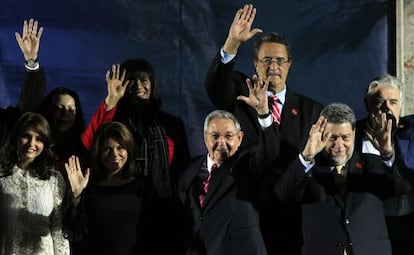CELAC summit closes in Havana with battle cry against poverty in region
Two-day gathering of 31 leaders seen as a diplomatic coup for Cuba

The Community of Latin American and Caribbean States (CELAC) summit, which ended Wednesday night in Havana, was seen as a huge diplomatic success for Cuba.
In their final declaration, the heads of state and regional governments pledged to battle the great scourges of the continent: poverty, hunger and inequality. They also condemned the US blockade of Cuba and voiced support for the ongoing peace process in Colombia, whose government representatives are engaged in ongoing talks with the Revolutionary Armed Forces of Colombia (FARC) in Havana.
The final document also included a reference to the late President Hugo Chávez of Venezuela, who was the driving force behind CELAC, created in 2011 to counter the Organization of American States (OAS). The CELAC declaration described him as a "tireless humanist.”
The leaders also made public a proclamation which defined Latin America and the Caribbean as a "zone of peace, "and pledged to eliminate the use of force in the region and to promote nuclear disarmament.
Cuba, which has been excluded from the Summits of the Americas and other regional meetings in the past, scored a diplomatic coup by managing to call together 31 of the 33 leaders who were initially invited to the gathering. In recent years, regional gatherings have only had lukewarm success because of the lack of attendance by many government leaders.
Salvadoran President Mauricio Funes excused himself for health reasons, while Ricardo Martinelli of Panama declined to attend in protest of the capture of a North Korean ship in the Panama Canal last year which was found to be carrying weapons from Cuba in violation of a UN arms embargo.
The government of Raúl Castro was not directly criticized over human rights issues by the leaders attending the summit – a completely different scenario from that of 1999 when then-Mexican President Ernesto Zedillo attacked the island’s communist government over the lack of freedoms. The charges, leveled at a similar conference of regional leaders, resulted in a chilling of relations between Cuba and Mexico.
Nonetheless, the most explicit reference to the human rights issue came from UN Secretary General Ban Ki-moon, who on Tuesday called on Havana to comply with international conventions regarding civil and political rights.
The summit also set the stage for some geopolitical strategizing
Cuban dissidents had expected some of the leaders to take a public stance on the issue. But only one delegation, headed by the ambassador and chief of foreign policy in Costa Rica, met on Wednesday with Elizardo Sánchez, the head of the Cuban Commission for Human Rights and National Reconciliation (CCDHRN). The low-profile meeting lasted about 25 minutes but was described by opponents of the Castro regime as "very fruitful." The dissidents asked the Costa Rican representatives, the so-called “champions of human rights on the continent," for greater involvement in the issue of political freedoms now that Costa Rica assumes the CELAC presidency.
In the days leading to the event, the CCDHRN denounced the fact that some dissidents have been arbitrarily detained and held under house arrest to prevent them from demonstrating or holding a parallel meeting during the two-day summit. Asked about the meeting with dissidents, Costa Rican Foreign Minister Enrique Castillo said his country “does not decline to hear any positions that someone wants to expound.”
“And this case is no different – we listen but do not intervene or interfere,” he said.
At the end of the summit, another diplomatic accomplishment for Cuba was announced. Members of the European Union (EU) have reached a consensus to launch negotiations on a bilateral agreement with Havana to build a new framework for strengthening relations. If the talks are successful, this structure could replace the current “Common Position” policy that was devised in 1996 by Spanish Prime Minister José María Aznar, which prohibits full diplomatic relations with the island’s government while there is no progress on human rights issues.
The summit also set the stage for some geopolitical strategizing. With Venezuela, Cuba’s most senior trade partner, finding itself in a weak position, nations such as Brazil and Mexico are vying for investment opportunities on the island now that the Cuban government has introduced a series of economic reforms.
On Monday, Brazil’s president, Dilma Rousseff, helped inaugurate a large port in Mariel, which was built by the Brazilian company Odebrecht thanks to a $1.09-billion investment.
At the same time, Mexico’s Enrique Peña Nieto also took advantage of his attendance at the summit to also try to rebuild the special relationship that both countries maintained during the first 40 years of Fidel Castro’s government. In a significant gesture, Mexico last November wrote off 70 percent of Cuba’s debt.
But there were also disputes at the summit. Danilo Medina, the president of Dominican Republic, attacked St. Vincent and the Grenadines Prime Minister Ralph Gonsalves for accusing his country of racial bias toward Haitians. Gonsalves has been one of the Caribbean’s most vocal critics of last year’s decision by the Dominican Constitutional Court to revoke the citizenship of thousands of people with foreign-born parents, affecting the children of Haitian immigrants.
There were also peace gestures made at the conference. Chilean President Sebastián Piñera met with his Peruvian counterpart, Ollanta Humala, and pledged to speed up work to implement the recent International Court of Justice ruling which settled a long-running dispute over both countries’ maritime borders in the Pacific.
Tu suscripción se está usando en otro dispositivo
¿Quieres añadir otro usuario a tu suscripción?
Si continúas leyendo en este dispositivo, no se podrá leer en el otro.
FlechaTu suscripción se está usando en otro dispositivo y solo puedes acceder a EL PAÍS desde un dispositivo a la vez.
Si quieres compartir tu cuenta, cambia tu suscripción a la modalidad Premium, así podrás añadir otro usuario. Cada uno accederá con su propia cuenta de email, lo que os permitirá personalizar vuestra experiencia en EL PAÍS.
¿Tienes una suscripción de empresa? Accede aquí para contratar más cuentas.
En el caso de no saber quién está usando tu cuenta, te recomendamos cambiar tu contraseña aquí.
Si decides continuar compartiendo tu cuenta, este mensaje se mostrará en tu dispositivo y en el de la otra persona que está usando tu cuenta de forma indefinida, afectando a tu experiencia de lectura. Puedes consultar aquí los términos y condiciones de la suscripción digital.









































